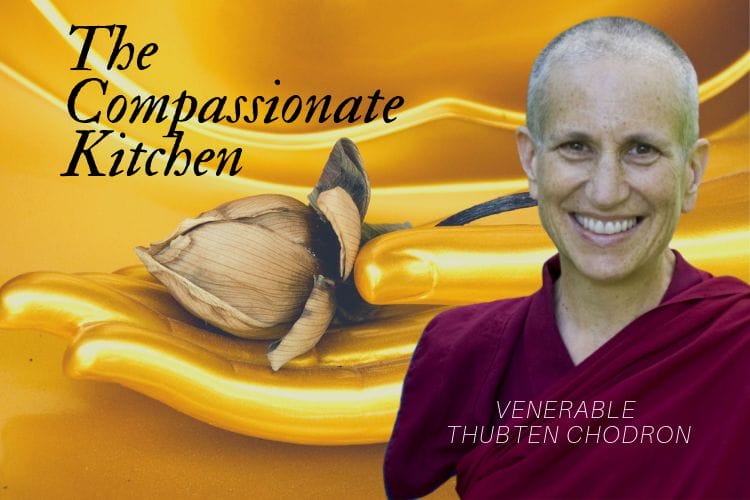Thubten Chodron: The Compassionate Kitchen

Okay, so, instead of seeing the food as, oh, this is good stuff. I’m going to, inhale it and get it into my stomach as soon as possible. We see it as medicine, and it nourishes our body and to really feel how what we eat affects our body.
I read the New York Times, and there was an article entitled, “Does What We Eat Affect Our Body,” and I thought, oh my goodness, they have to ask that question. It’s so clear that it does, and what we eat affects our feelings too. If we don’t eat a balanced diet, our body gets out of whack. So, if we eat a lot of sugar, then we get the sugar highs and the sugar lows. So, it’s very clear that the food really is like medicine to us, and it affects our mental state and our spiritual state.
The last reflection is, “I contemplate the aim of Buddhahood, accepting and consuming this food to accomplish it.” And so, seeing that the causes and conditions for receiving the food, and making a determination to keep our mind in a good state while we eat and seeing the food as medicine.
I have this responsibility to do my practice, and I’m aiming for complete awakening or Buddhahood. And so, I accept this food to sustain my body and mind so that I can accomplish the spiritual path. I’m meditating and practicing the spiritual path so I can be of the greatest benefit to other living beings.
So, our practice is not just for ourselves. It’s really to improve our self, gain new qualities so that we can really be of increased benefit to other living beings.
Sandie Sedgbeer: You also say that many aspects of this apply to family life as well. Tell me about how we could introduce our children to mindful eating, how could we develop this as a practice at home.
Venerable Thubten Chodron: Those five contemplations that I did, I think those are very suitable for a family to do. What an incredible way, if you have children, to get children thinking about the causes of the food, where their food came from, and all the people that were involved in growing and transporting and making the food. So, to really get them to think about the whole process of growing and producing food and learn about the lives of people who do that. I think that’s a good thing for kids.
So, getting the kids involved in–in preparing the food, and I think that’s a great thing for kids, because then, when they go out on their own, in their teen years or early 20s, then they know how to take care of themselves and, cook food themselves.
It’s important for families to sit down and have time to talk together every day, and dinner time is a good time to do it. We’re a family, and we share the day. And so, sitting down to eat and, taking the time to really talk to your kids. I know one family that goes around, and in the evening when they eat dinner, they each say something that they learned that day, including the parents,
So, that everybody is sharing how they’re growing on a day-to-day basis, and so, taking the time to have these kinds of conversations about what you’re feeling, how–what you are seeing and experiencing and what that means to you as a human being, even, what you hear in the daily news and how that’s affecting you and, to communicate with your family members about that.
It’s a wonderful kind of thing to do, starting when the kids are little and, growing through teenage years because that way when you do that, you’re able to teach your kids values. If you don’t have time to listen to your kids and what’s going on in their lives, then there’s no time to discuss how do you handle difficult situations, or what do you think about when somebody does this or when this is going on in the world.
Sandie Sedgbeer: What’s the reaction that you’re receiving to this book, which, is probably different but maybe not so far removed from what you share in your other books, in terms of philosophies?
Venerable Thubten Chodron: Yeah, the reaction’s been good. the people have been very interested in it, the publisher especially. I was a little bit surprised actually how interested the publisher was in this book because they really promoted it. So, they see something, that is a need in society that the book fulfills. So, we’ve had a very good response to this.
Sandie Sedgbeer: Yes. So, let’s talk about some of the other things that the abbey does and other resources that you offer to people. I mean, you’ve done a lot of work in the community. You’ve done work in prisons. You’ve done work with homeless teenagers, etc. Tell us about some of the outreach that you do in the community.
Venerable Thubten Chodron: Part of our philosophy is, to cultivate loving kindness and compassion in our hearts but then also to show them, and to be of service to society.
So, for example with the prison work, I never intended and again, another thing I never intended to do, but one day, I got a letter from somebody in federal prison in Ohio, asking, for Buddhist resources and having questions about Buddhism. So, we started corresponding, and I didn’t think twice about answering his letter. There wasn’t a thing of, oh no, there’s a prisoner who’s writing me, ahh, it’s dangerous.
There wasn’t that thought because I’ve taken precepts to, when people ask for help, to do whatever I can do to be of service to them. So, I thought, yeah, I can send this guy some books.
I can answer his questions, and then, he began to tell other people that he knew in prison.
And the word kind of spread, and then, other prison groups contacted us. And then, soon, it just developed organically, and now, we correspond with over a thousand inmates in our database. We send them books. We send them materials. We do a retreat every year that we invite them to join, even though they’re meditating in prison, and I go and do talks in prisons, prison visits, and other people in the abbey do.
It’s a program that just developed very naturally, and it’s so rewarding because these are people that society has thrown away. They just say, they’re worthless, and that’s not true at all, these people have talents. They have interests. They have feelings, and through our work, we can really see some of the people change and develop, to think about their lives, to think about what is valuable.
There’s a lot of discussions now in the press about prison reform, and I really see the value in this because by talking to guys who are living in prison, I’ve really come to see what the system is like and how much it needs improvement.
With the work with the homeless teens, somebody in the local community came to talk to us one day about, they were doing work with homeless teens, and we just said, wow, we want to help because I know, as a teenager myself, I was quite confused. I can’t imagine not having a stable living situation as a kid, especially because of your body’s changing, your mind is confused.
So, we wanted to help with that and, help provide services to the kids.
We get a lot of requests from different places in the community. When hospitals are having an in-service about helping the dying, they often ask us to come to present the Buddhist viewpoint on death and dying and how to help the dying.
We get requests and last night, I was at a synagogue. They had a, as part of their youth group, where they want the kids to learn about different religions. I was invited to come and speak. We have all sorts of people in the community calling and asking us to come to speak and to share ideas.
Sandie Sedgbeer: You have an online education program. You also have thousands of teachings on YouTube, and you’re very active on social media. You have two websites full of Dharma materials. Again, all of this freely offered.
How are you supported? I mean, when you go out, and you do talks, do people make donations? Do you get paid for the work, the lectures, etc., because there must be something coming in to support the expense?
Venerable Thubten Chodron: Yeah, for sure. But we do everything free of charge. It’s like I said, we want to live a life of generosity, and people reciprocate. So, when people, invite one of us, to go and teach, they cover the transportation cost. They make all the arrangements, and then, they usually give a donation. We don’t stipulate the amount of the donation. Again, it’s this thing of whatever people want to give, we accept with gratitude.
Continue to Page 4 of the Interview with Venerable Thubten Chodron – The Compassionate Kitchen
A veteran broadcaster, author, and media consultant, Sandie Sedgbeer brings her incisive interviewing style to a brand new series of radio programs, What Is Going OM on OMTimes Radio, showcasing the world’s leading thinkers, scientists, authors, educators and parenting experts whose ideas are at the cutting edge. A professional journalist who cut her teeth in the ultra-competitive world of British newspapers and magazines, Sandie has interviewed a wide range of personalities from authors, scientists, celebrities, spiritual teachers, and politicians.





